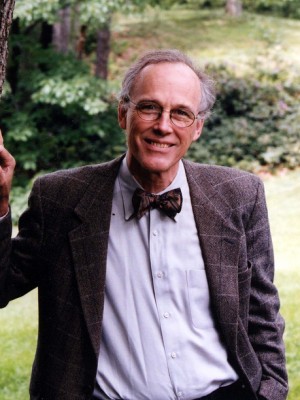Odum Environmental Ethics Lecture
The Odum Environmental Ethics Lecture is presented by the Willson Center and the Environmental Ethics Certificate Program, an interdisciplinary certificate program of the College of Environment and Design in cooperation with the Odum School of Ecology and the Department of Philosophy. The lecture provides an interdisciplinary forum for students, faculty, and the community to hear and share perspectives on social and scientific responsibilities toward our environment.
Eugene Odum (1913-2002) was an influential University of Georgia instructor from 1940 until his retirement in 1984. He is considered to be the “Father of Modern Ecology” and was the author of the pioneering book Fundamentals of Ecology. Odum was instrumental in the creation of the Institute of Ecology at the University of Georgia, the Savannah River Ecology Laboratory near Aiken, S.C., and the Sapelo Island Marine Science Institute.
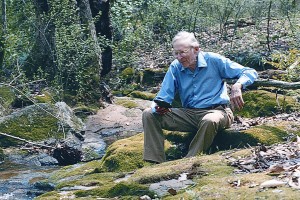
2025
Wade Davis
Wade Davis is professor of anthropology and the BC Leadership Chair in Cultures and Ecosystems at Risk at the University of British Columbia. His talk is based on his 2009 book The Wayfinders: Why Ancient Wisdom Matters in the Modern World.
An ethnographer, writer, photographer and filmmaker, Davis served as Explorer-in-Residence at the National Geographic Society from 2000-2013. Named by the NGS as one of the Explorers for the Millennium, he has been described as “a rare combination of scientist, scholar, poet and passionate defender of all of life’s diversity.” Davis is the author of hundreds of articles and 23 books including The Serpent and the Rainbow (1986), One River: Explorations and Discoveries in the Amazon Rain Forest (1996), and Magdalena: River of Dreams (2020).
Every culture is a unique answer to a fundamental question: What does it mean to be human and alive? In this talk, Wade Davis leads us on a thrilling journey to celebrate the wisdom of the world’s indigenous cultures. In Polynesia we set sail with navigators whose ancestors settled the Pacific ten centuries B.C. In the Amazon we meet the descendants of a true Lost Civilization, the Peoples of the Anaconda. In the Andes we discover that the Earth really is alive, while in the far reaches of Australia we experience Dreamtime, the all-embracing philosophy of the first humans to walk out of Africa. We then travel to Nepal, where we encounter a wisdom hero, a Bodhisattva, who emerges from 45 years of Buddhist retreat and solitude. And finally, we settle in Borneo, where the last rainforest nomads struggle to survive.
Understanding the lessons of this journey will be our mission for the next century. Of the world’s 7000 languages, fully half may disappear within our lifetimes. At risk is a vast archive of knowledge and expertise, a catalogue of the imagination that is the human legacy. Rediscovering a new appreciation for the diversity of the human spirit, as expressed by culture, is among the central challenges of our time.
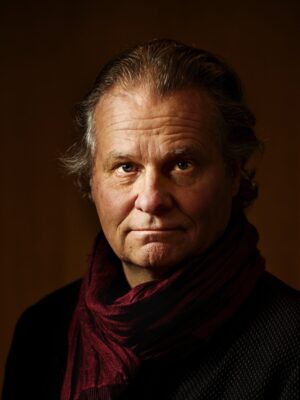
2024
Mary Reynolds
Mary Reynolds is a “reformed” internationally acclaimed landscape designer who launched her career at the Chelsea Flower Show in 2002, the story of which was told in the 2016 film Dare to be Wild. She is a bestselling author, inspirational speaker, occasional television presenter, and founder of “We Are the ARK,” an international practical movement intended to “shift the environmental game in nature’s favor.” The movement posits that “the time for gardens as canvases for our creative pleasure is over. Everything must change and if we are to save the planet, then we must start with our own patches of it. It’s time to re-imagine our work as gardeners, to become leaders in the race to save our beautiful planet, to save ourselves.”

2023
Jack Davis
Jack Davis, Rothman Family Chair in the Humanities at the University of Florida, gave the 2023 Odum Environmental Ethics Lecture on “The Bald Eagle: The History of a Symbol and Species.”
Davis specializes in environmental history and sustainability studies, and is the Pulitzer Prize-winning author of The Gulf: The Making of an American Sea (2017). His 2022 book The Bald Eagle: The Improbable Journey of America’s Bird (Liveright/W. W. Norton) was named a New York Times Book Review Editor’s Choice, one of the five best nonfiction books of 2022 by the LA Times, an Amazon Best Book of 2022, and an Apple Best Book of 2022.
Davis was one of the recipients of the 2019 Andrew Carnegie fellowship award. His previous books include Race Against Time: Culture and Separation in Natchez Since 1930 (2001), winner of the Charles S. Sydnor Prize for the best book in southern history, and An Everglades Providence: Marjory Stoneman Douglas and the American Environmental Century (UGA Press, 2009), which received a gold medal from the Florida Book Awards.
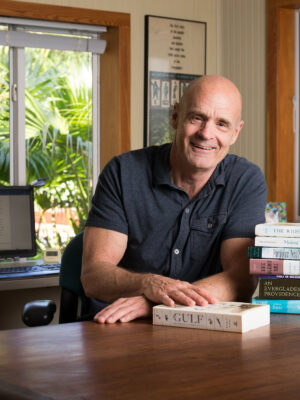
2022
Ryan Emanuel
Ryan Emanuel, associate professor of hydrology in Duke University’s Nicholas School of the Environment, gave the 2022 Odum Environmental Ethics Lecture, “On the Swamp: Indigenous Erasure, Environmental Justice, and the Transformation of North Carolina’s Coastal Plain.”
Emanuel is known for his innovative scholarship on water, environmental justice and Indigenous rights. Before his Jannuary 2022 appointment at Duke, he led the Ecohydrology and Watershed Science Lab at North Carolina State University, where he was a University Faculty Scholar and professor in the Department of Forestry and Environmental Resources, and a faculty fellow at the Center for Geospatial Analytics.
A prolific researcher with nearly 50 peer-reviewed publications to his credit, he is widely cited for his studies on water and biogeochemical cycles in mountain landscapes; the effects of saltwater intrusion on coastal freshwater ecosystems; and the impacts of climate change and land-use change on Indigenous lands and communities.
Emanuel is an enrolled member of the Lumbee Tribe of North Carolina, and he frequently combines tools and ideas from both the academic tradition and Indigenous knowledge systems in his studies and teaching.
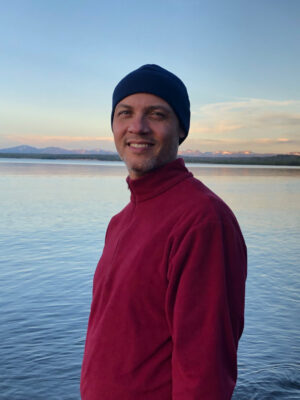
2019
Barry Lopez
Barry Lopez is an essayist, author, and short-story writer, and has traveled extensively in remote and populated parts of the world.
He is the author of Arctic Dreams, for which he received the National Book Award; Of Wolves and Men, a National Book Award finalist, for which he received the John Burroughs and Christopher medals; and eight works of fiction, including Light Action in the Caribbean, Field Notes, and Resistance. His essays are collected in two books, Crossing Open Ground and About This Life.
His most recent books are Home Ground: Language for an American Landscape (2006), a reader’s dictionary of regional landscape terms, which he edited with Debra Gwartney, and Outside (2015), a collection of six stories with engravings by Barry Moser. His new book, Horizon, will be published in March 2019 by Penguin Random House.
Lopez contributes regularly to Harper’s, Granta, The Georgia Review, Orion, Outside, The Paris Review, Manoa, and other publications in the United States and abroad. His work is widely translated and appears in dozens of anthologies.
Lopez has served as the Welch Professor of American Studies at the University of Notre Dame and the Glenn Distinguished Professor at Washington & Lee University. He has also taught at the Bread Loaf Writers’ Conference and other venues, and read or spoken at nearly a hundred universities. He travels regularly to Texas Tech University where he is the university’s Visiting Distinguished Scholar. He is a recipient of the Award in Literature from the American Academy of Arts and Letters, the John Hay Medal, Guggenheim, Lannan, and National Science Foundation fellowships, Pushcart Prizes in fiction and nonfiction, the St. Francis of Assisi Award from DePaul University, the Denise Levertov Award from Image magazine, and honors from the Academy of Television Arts and Sciences, the Association of American Geographers, the New York Public Library, the Nature Conservancy, and the American Society of Magazine Editors. In 2002 he was elected a Fellow of The Explorers Club.
In addition to being part of the Global Georgia Initiative public event series, Lopez’s talk is presented as The Georgia Review‘s Earth Day Lecture and the Odum Environmental Ethics Lecture.
This event is associated with the Global Georgia Initiative research group in Coastal Studies, funded by The Andrew W. Mellon Foundation.
It is presented in partnership with The Georgia Review, the Environmental Ethics Certificate Program, the Sustainability Certificate Program, and the department of English.
The Global Georgia Initiative presents global problems in local context by addressing pressing contemporary questions, including the economy, society, and the environment, with a focus on how the arts and humanities can intervene. Global Georgia combines the best in contemporary thinking and practice in the arts and humanities with related advances in the sciences and other areas. The series is made possible by the support of private individuals and the Willson Center Board of Friends.
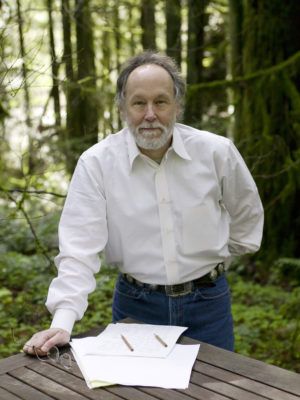
2016
David Haskell
David Haskell is an author and professor of biology at The University of the South. Among many other awards, Haskell’s book The Forest Unseen: A Year’s Watch in Nature won the 2013 Best Book Award from the National Academies and was a finalist for the 2013 Pulitzer Prize in General Nonfiction.
His visit to UGA was co-sponsored by the Willson Center, the Environmental Ethics Certificate Program, and the Integrative Conservation Ph.D. Program. Haskell’s lecture was the keynote for the Third Annual Symposium on Integrative Conservation.
The Odum Environmental Ethics Lecture is named for Eugene Odum (1913-2002), a UGA instructor from 1940 until his retirement in 1984. He has been called the “father of modern ecology” and was the author of the pioneering book Fundamentals of Ecology. Odum was instrumental in the creation of the Institute of Ecology at UGA, the Savannah River Ecology Laboratory, and the Sapelo Island Marine Science Institute.
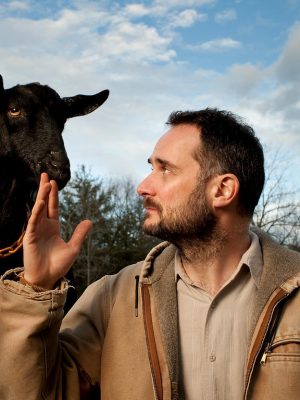
2015
Zygmunt Plater
Zygmunt Plater, professor of law at Boston College, gave the 2015 Odum Environmental Ethics Lecture, titled “The Snail Darter and the Dam: a very small endangered fish’s travels through the corridors of American power.” The event was co-sponsored by the Environmental Ethics Certificate Program and the Willson Center, with additional support from the Georgia Natural History Museum.
Plater’s latest book, The Snail Darter and the Dam: How Pork-Barrel Politics Endangered a Little Fish and Killed a River, was published by Yale University Press in 2013. It is his chronicle of a landmark case, Tennessee Valley Authority v. Hill – better known as the “snail darter” case – which Plater argued before the U.S. Supreme Court in 1978.
TVA v. Hill is often cited, especially by opponents to environmental regulations, as an example of overzealous enforcement of such policies – in this case, the Endangered Species Act. But the case involved numerous issues aside from the protection of the endangered fish by whose name it is known. Opposition to the construction of the Tellico Dam was also based on the project’s economic viability, as well as to the property rights of small farmers and other landowners.
The court ruled for the group of plaintiffs represented by Plater, but the dam was nonetheless completed the following year after the U.S. Congress passed an amendment to the Endangered Species Act, signed into law by President Jimmy Carter, granting the TVA an exception to the act’s provisions.
